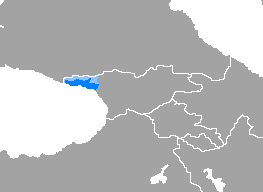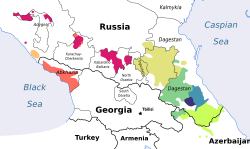Abkhaz language
| Abkhaz Language | |
|---|---|
| Abkhazian | |
| Аҧсуа бызшәа; аҧсшәа Apsua byzshwa; apsshwa | |
 | |
| Native to | Abkhazia and Abkhaz diaspora |
| Ethnicity | Abkhazians |
Native speakers | 190,110 (2014–2015)[1] |
Northwest Caucasian
| |
| Dialects |
|
| Cyrillic (Abkhaz alphabet) Historically: Latin, Georgian | |
| Official status | |
Official language in | Republic of Abkhazia;[a] Autonomous Republic of Abkhazia, Georgia |
| Language codes | |
| ISO 639-1 | ab Abkhazian |
| ISO 639-2 | abk Abkhazian |
| ISO 639-3 | abk Abkhazian |
| Glottolog | abkh1244 Abkhazian |
 | |
Abkhaz (/æbˈkɑːz/;[2] /æpˈhɑːz/;[3] sometimes spelled Abxaz; Аԥсуа бызшәа /apʰswa bɨzʃʷa/), also known as Abkhazian,[4][5][6] is a Northwest Caucasian language most closely related to Abaza. It is spoken mostly by the Abkhaz people. It is one of the official languages of Abkhazia[a], where around 100,000 people speak it.[1] Furthermore, it is spoken by thousands of members of the Abkhazian diaspora in Turkey, Georgia's autonomous republic of Adjara, Syria, Jordan and several Western countries. The Russian census of 2010 reported 6,786 speakers of Abkhazian in Russia.[7]
Classification
Abkhaz is a Northwest Caucasian language and is therefore related to Adyghe. It is especially close to Abaza, and they are sometimes considered dialects of the same language, Abazgi, of which the literary dialects of Abkhaz and Abaza are simply two ends of a dialect continuum. Grammatically, the two are very similar; however, the differences in phonology are substantial and are the main reason for many other linguists preferring to keep the two separate. Most linguists (instance, Chirikba 2003) believe that Ubykh is the closest relative to the Abkhaz–Abaza dialect continuum.
Geographical distribution
Abkhaz is spoken primarily in Abkhazia. Abkhaz is also spoken by members of the large Abkhaz Muhajir diaspora, mainly located in Turkey, with smaller groups living in Syria, Iraq, and Jordan; the Georgian autonomous republic of Adjara; throughout the former Soviet Union (e.g. Armenia and Ukraine); and – through more recent emigration – in Western countries such as Germany, the Netherlands, and the United States. However, the exact number of Abkhaz speakers in these countries remains unknown due to a lack of official records.
History
The earliest extant written records of the Abkhaz language are in the Arabic script, recorded by the Turkish traveller Evliya Çelebi in the 17th century. Abkhaz has been used as a literary language for only about 100 years.
Dialects
Abkhaz is generally viewed as having three major dialects:
- Abzhywa, spoken in the Caucasus, and named after the historical area of Abzhywa (Абжьыуа), sometimes referred to as Abzhui, the Russified form of the name (Abzhuiski dialekt, derived from the Russian form of the name for the area, Абжуа).
- Bzyb or Bzyp, spoken in the Caucasus and in Turkey, and named after the Bzyb (Template:Lang-ab) area.
- Sadz, nowadays spoken only in Turkey, formerly also spoken between the rivers Bzyp and Khosta.
The literary language is based on the Abzhywa dialect.
Phonology
Abkhaz has a very large number of consonants (58 in the literary dialect), with three-way voiced/voiceless/ejective and palatalized/labialized/plain distinctions. By contrast, the language has only two phonemically distinct vowels—which, however, have several allophones depending on the palatal and/or labial quality of adjacent consonants.
Phonemes in green are found in the Bzyp and Sadz dialects of Abkhaz, but not in Abzhywa; phonemes in blue are unique to the Bzyp dialect.
| Labial | Alveolar | Post- alveolar |
Alveolo- palatal |
Retro- flex |
Velar | Uvular | Pharyngeal | ||||||||||||
|---|---|---|---|---|---|---|---|---|---|---|---|---|---|---|---|---|---|---|---|
| plain | lab. | plain | lab. | plain | lab. | pal. | plain | lab. | pal. | plain | lab. | phar. | lab. + phar. | plain | lab. | ||||
| Nasal | m | n | |||||||||||||||||
| Stop | voiceless | p | t | tʷ | kʲ | k | kʷ | ||||||||||||
| voiced | b | d | dʷ | ɡʲ | ɡ | ɡʷ | |||||||||||||
| ejective | pʼ | tʼ | tʷʼ | kʲʼ | kʼ | kʷʼ | qʲʼ | qʼ | qʷʼ | ||||||||||
| Affricate | voiceless | t͡s | t͡ʃ | t͡ɕ | t͡ɕʷ | ʈ͡ʂ | |||||||||||||
| voiced | d͡z | d͡ʒ | d͡ʑ | d͡ʑʷ | ɖ͡ʐ | ||||||||||||||
| ejective | t͡sʼ | t͡ʃʼ | t͡ɕʼ | t͡ɕʷʼ | ʈ͡ʂʼ | ||||||||||||||
| Fricative | voiceless | f | s | ʃ | ʃʷ | ɕ | ɕʷ | ʂ | χʲ | χ | χʷ | χˤ | χˤʷ | ħ | ħʷ | ||||
| voiced | v | z | ʒ | ʒʷ | ʑ | ʑʷ | ʐ | ʁʲ | ʁ | ʁʷ | |||||||||
| Approximant | l | j | ɥ | w | |||||||||||||||
| Trill | r | ||||||||||||||||||
Grammar
Abkhaz is typologically classified as a polysynthetic and agglutinative language. Like all other Northwest Caucasian languages, Abkhaz has an extremely complex verbal system coupled with a very simple noun system. Viacheslav Chirikba has characterized Abkhaz as a "verbcentric language", as the verb occupies the central place in Abkhaz morphology.
Abkhaz is an ergative–absolutive language that distinguishes just two cases, the nominative and the adverbial.
Writing system
Abkhaz has used the Cyrillic script since 1862. The first alphabet was a 37-character Cyrillic alphabet invented by Baron Peter von Uslar. In 1909 a 55-letter Cyrillic alphabet was used. A 75-letter Latin script devised by a Russian/Georgian linguist Nikolai Marr lasted for 2 years 1926–1928 (during the Latinization campaign). The Georgian script was adopted and used in 1938–54 years after was restored the initial Cyrillic alphabet designed in 1892 by Dmitry Gulia together with Konstantin Machavariani and modified in 1909 by Aleksey Chochua.
| А а [a] |
Б б [b] |
В в [v] |
Г г [ɡ] |
Гь гь [ɡʲ] |
Гә гә [ɡʷ] |
Ӷ ӷ [ʁ/ɣ] |
Ӷь ӷь [ʁʲ/ɣʲ] |
| Ӷә ӷә [ʁʷ/ɣʷ] |
Д д [d] |
Дә дә [dʷ] |
Е е [a/ja] |
Ж ж [ʐ] |
Жь жь [ʒ] |
Жә жә [ʒʷ] |
З з [z] |
| Ӡ ӡ [d͡z] |
Ӡә ӡә [d͡ʑʷ] |
И и [j/jɨ/ɨj] |
К к [kʼ] |
Кь кь [kʼʲ] |
Кә кә [kʼʷ] |
Қ қ [kʰ] |
Қь қь [kʲʰ] |
| Қә қә [kʷʰ] |
Ҟ ҟ [qʼ] |
Ҟь ҟь [qʼʲ] |
Ҟә ҟә [qʼʷ] |
Л л [l] |
М м [m] |
Н н [n] |
О о [a/wa] |
| П п [pʼ] |
Ԥ ԥ [pʰ] |
Р р [r] |
С с [s] |
Т т [tʼ] |
Тә тә [tʼʷ] |
Ҭ ҭ [tʰ] |
Ҭә ҭә [tʷʰ] |
| У у [w/wɨ/ɨw] |
Ф ф [f] |
Х х [x/χ] |
Хь хь [xʲ/χʲ] |
Хә хә [xʷ/χʷ] |
Ҳ ҳ [ħ] |
Ҳә ҳә [ħʷ] |
Ц ц [t͡sʰ] |
| Цә цә [t͡ɕʷʰ] |
Ҵ ҵ [t͡sʼ] |
Ҵә ҵә [t͡ɕʼʷ] |
Ч ч [t͡ʃʰ] |
Ҷ ҷ [t͡ʃʼ] |
Ҽ ҽ [t͡ʂʰ] |
Ҿ ҿ [t͡ʂʼ] |
Ш ш [ʂ] |
| Шь шь [ʃ] |
Шә шә [ʃʷ] |
Ы ы [ɨ] |
Ҩ ҩ [ɥ/ɥˤ] |
Џ џ [d͡ʐ] |
Џь џь [d͡ʒ] |
Ь ь [ʲ] |
Ә ә [ʷ] |
Status
Both Georgian and Abkhaz law enshrines an official status of the Abkhaz language in Abkhazia.
The 1992 law of Georgia, reiterated in the 1995 constitution, grants Abkhaz the status of second official language in the territory of Abkhazia — along with Georgian.
In November 2007, the de facto authorities of Abkhazia adopted a new law "on the state language of the Republic of Abkhazia" that mandates Abkhaz as the language of official communication. According to the law, all meetings held by the president, parliament, and government must be conducted in Abkhaz (instead of Russian, which is currently a de facto administrative language) from 2010, and all state officials will be obliged to use Abkhaz as their language of everyday business from 2015. Some, however, have considered the implementation of this law unrealistic and concerns have been made that it will drive people away from Abkhazia and hurt the independent press due to a significant share of non-Abkhaz speakers among ethnic minorities as well as Abkhaz themselves, and a shortage of teachers of Abkhaz. The law is an attempt to amend a situation where up to a third of the ethnic Abkhaz population are no longer capable of speaking their ethnic language, and even more are unable to read or write it; instead, Russian is the language most commonly used in public life at present.[8]
Sample text
- Romanization
- Darbanzaalak auaɥy dshoup ihy daqwithny. Auaa zegj zinlei patulei eiqaroup. Urth irymoup ahshyɥi alamysi, dara daragj aesjei aesjei reiphsh eizyqazaroup.
- Translation
- "All human beings are born free and equal in dignity and rights. They are endowed with reason and conscience and should act towards one another in a spirit of brotherhood."
Notes
- ^ a b The political status of Abkhazia is disputed. Having unilaterally declared independence from Georgia in 1992, Abkhazia is formally recognised as an independent state by 5 UN member states (two other states previously recognised it but then withdrew their recognition), while the remainder of the international community recognizes it as de jure Georgian territory. Georgia continues to claim the area as its own territory, designating it as Russian-occupied territory.
References
- ^ a b "Abkhaz". Ethnologue. Retrieved 2018-05-03.
- ^ "abkhaz". Oxford English Dictionary (Online ed.). Oxford University Press. (Subscription or participating institution membership required.)
- ^ Laurie Bauer, 2007, The Linguistics Student's Handbook, Edinburgh
- ^ Cite error: The named reference
Glottologwas invoked but never defined (see the help page). - ^ "Documentation for ISO 639 identifier: abk". ISO 639-2 Registration Authority - Library of Congress. Retrieved 2017-07-04.
Name: Abkhazian
- ^ "Documentation for ISO 639 identifier: abk". ISO 639-3 Registration Authority - SIL International. Retrieved 2017-07-04.
Name: Abkhazian
- ^ Row 7 in Приложение 6: Население Российской Федерации по владению языками [Appendix 6: Population of the Russian Federation by languages used] (XLS) (in Russian). Федерадьная служба государственной статистики [Federal State Statistics Service].
{{cite web}}: CS1 maint: extra punctuation (link) - ^ Anahid Gogorian (December 20, 2007), Abkhaz Worried by Language Law. Institute for War and Peace Reporting Caucasus Reporting Service No. 424.
- ^ "Archived copy" (PDF). Archived from the original (PDF) on 2008-11-21. Retrieved 2009-05-17.
{{cite web}}: Unknown parameter|deadurl=ignored (|url-status=suggested) (help)CS1 maint: archived copy as title (link)
Bibliography
- Chirikba, V. A. (1996) A Dictionary of Common Abkhaz. Leiden.
- Chirikba, V. A. (2003) "Abkhaz". Languages of the World/Materials 119. Muenchen: Lincom Europa.
- Hewitt, B. George (2010) Abkhaz: A Comprehensive Self Tutor Muenchen, Lincom Europa ISBN 978-3-89586-670-8
- Hewitt, B. George (1979) Abkhaz: A descriptive Grammar. Amsterdam: North Holland.
- Hewitt, B. George (1989) Abkhaz. In John Greppin (ed.), The Indigenous Languages of the Caucasus Vol. 2. Caravan Books, New York. 39-88.
- Vaux, Bert and Zihni Psiypa (1997) "The Cwyzhy Dialect of Abkhaz". Harvard Working Papers in Linguistics 6, Susumu Kuno, Bert Vaux, and Steve Peter, eds. Cambridge, MA: Harvard University Linguistics Department.
External links
- Introduction, basic phrases and grammar and texts
- Abkhaz alphabet and pronunciation (Omniglot)
- Abkhaz entry in LanguageServer (University of Graz)
- Abkhaz at Language Museum
- Example of Abkhaz language
- Abkhaz-Russian On-Line Dictionary
- Ancient Adyghe Abkhaz–Abaza Ubykh alphabet
- Abkhaz basic lexicon at the Global Lexicostatistical Database
- Abkhaz text corpus
- Recordings of Abkhaz
- World Atlas of Language Structures information on Abkhaz


